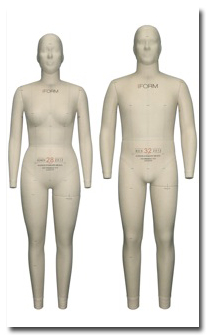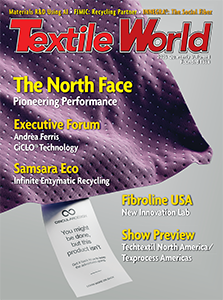Some people may think that this cannot be true: How is it possible that the United States is having
a boom in textiles? There is an array of reasons, and a few of them are important for the U.S.
textile industry.
A $50 Billion Investment
Some days ago, it was announced in the press that Walmart is willing to spend $50 billion in
10 years on the textile manufacturing industry in the United States
(See ”
From
The Editor: $50 Billion — Walmart’s 10-year Commitment,”
TextileWorld.com, January/February 2013).
For a long time there has been a public relations campaign in the United States to encourage
consumers to buy Made in USA products. However, one could see that many companies supported this
slogan in public but purchased anyway in Asia. This commitment of Walmart President and CEO Bill
Simon is quite remarkable, and the message has had a great impact on the global map of the
producing textile industry. So, it’s time to take out the magnifying glass and get a closer look at
the recent U.S. market climate:
Questionable Third Quarter 2012
According to the latest International Textile Manufacturers Federation (ITMF) state of trade
statistics, the “output of global yarn production rose in the Q3/2012 in comparison to the previous
one due to higher output in Asia and South America, while production in Europe and North America
was down. Also in comparison to last year’s third quarter, yarn production rose in all regions
apart from North America.”
Furthermore, writes ITMF, “World fabric production increased in Q3/2012 in spite of lower
output in Europe due to increased production levels in Asia and South America. Year-on-year global
fabric production was down; while it increased in Europe, it decreased both in Asia and South
America. Global fabric stocks rose slightly in comparison to Q2/2012 as a consequence of higher
inventories in Asia and South America and despite lower ones in Europe and North America.”
ITMF continues: “In comparison with the previous quarter, world yarn output rose in Q3/2012
by +7.5 percent as a result of high production in Asia (+8.5 percent), due to higher output in
China (+9.3 percent), India (+7.6 percent), and Pakistan (+1.9 percent). Yarn production in South
America increased by +2.6 percent. Yarn output fell significantly in North America (-10.0
percent).”
(For the complete ITMF state of trade summary, see ”
Global
Yarn And Fabric Output Rose In Q3/2012,”
TextileWorld.com, February 5, 2013.)
So, why are the spinners and the textile machinery industry full of expectations for the time
being? On a recent tour in Germany, the Rupp Report asked some opinion leaders about their
experiences in the last five to six months with the textile markets in the United States.
Various Reasons
Edda Walraf, head of marketing, Rieter Ltd., Switzerland, confirmed that “Rieter is also
experiencing a stimulation of demand in the U.S. Many things are on the move. Reasons for this are,
first of all, subsidized cotton, and also favorable production costs as well as more expensive
imports on the market. Maybe the Made in USA movement is also having some influence, but, as we all
know, at the end of the day, it’s the price. Most projects are replacements for existing mills.
Labor costs are a very important issue when it comes to rotor and air-jet spinning.”
Nicolai Strauch, press officer at the VDMA Textile Machinery Association, is also confirming
the trend: “Yes, our members are recognizing a positive trend in the U.S. Business is very active
with the U.S. textile industry. At the moment, the U.S. is one of the top markets for German
textile machinery — together with China, Turkey and India.”
He also mentioned a quite remarkable move from one of the leading brands in global
sportswear, adidas: “We know that adidas is moving part of its Chinese production to Myanmar
(Burma). The production plant in Suzhou will be closed.”
The Rupp Report has some more in-depth information from various sources, which confirm this
trend of shifting production out of China because of higher production costs there, which basically
occur from soaring energy prices and increased labor costs.
Zschimmer & Schwarz, with its headquarters in Lahnstein, Germany, is an international
supplier of a broad variety of tailor-made specialties and auxiliaries for different industries,
including fibers and fabrics with more than 20 companies and participation in 15 countries.
“Yes,” said Andrea Proefrock, director, Fibre Auxiliaries business unit, Zschimmer &
Schwarz, “the U.S. market is developing very well. After an average start in 2012, the second half
of the year increased steadily.” When asked what are the main reasons for this boom, Proefrock
answered: “Well, the U.S. market is looking more and more for niche products and, consequently,
high-quality products. As a producer of tailor-made auxiliaries, we have the right products to
serve the requirements of the U.S. textile industry. And we see no reason that this positive trend
will be coming to an end in the near future.”
Dominant Far East
However, according to Proefrock, Asia is still dominating the market, mainly for man-made
fibers. Eighty percent of the global man-made-fiber production is in China, Taiwan and Korea; and
Indonesia is getting closer to being an important player, too. “And,” she said, “this is not only
for commodities like POY [partially oriented yarn] and similar yarns. These markets are producing
more and more specialty yarns.” Zschimmer & Schwarz is serving other sectors of the textile
industry, too, such as fabrics for industrial applications and nonwovens.
Times are favorable for the United States. Cheap energy prices, competitive production lines
and decent labor costs, blended with the ever-ongoing will to succeed, make the United States a
highly competitive supplier for the global textile industry, and certainly for fibers and yarns. To
close this Rupp Report with another quote from Bill Simon: “If we can help create these jobs here,
it will make us proud as Americans. It’s crazy that 70 percent of cotton grown in the US is shipped
overseas, spun into products and then often shipped right back here. We can cut out two shipments
across the world and weeks on the water and cut our costs in the process. We can save our customers
money by employing more of their neighbors — why wouldn’t we do this?” Period.
February 5, 2013





